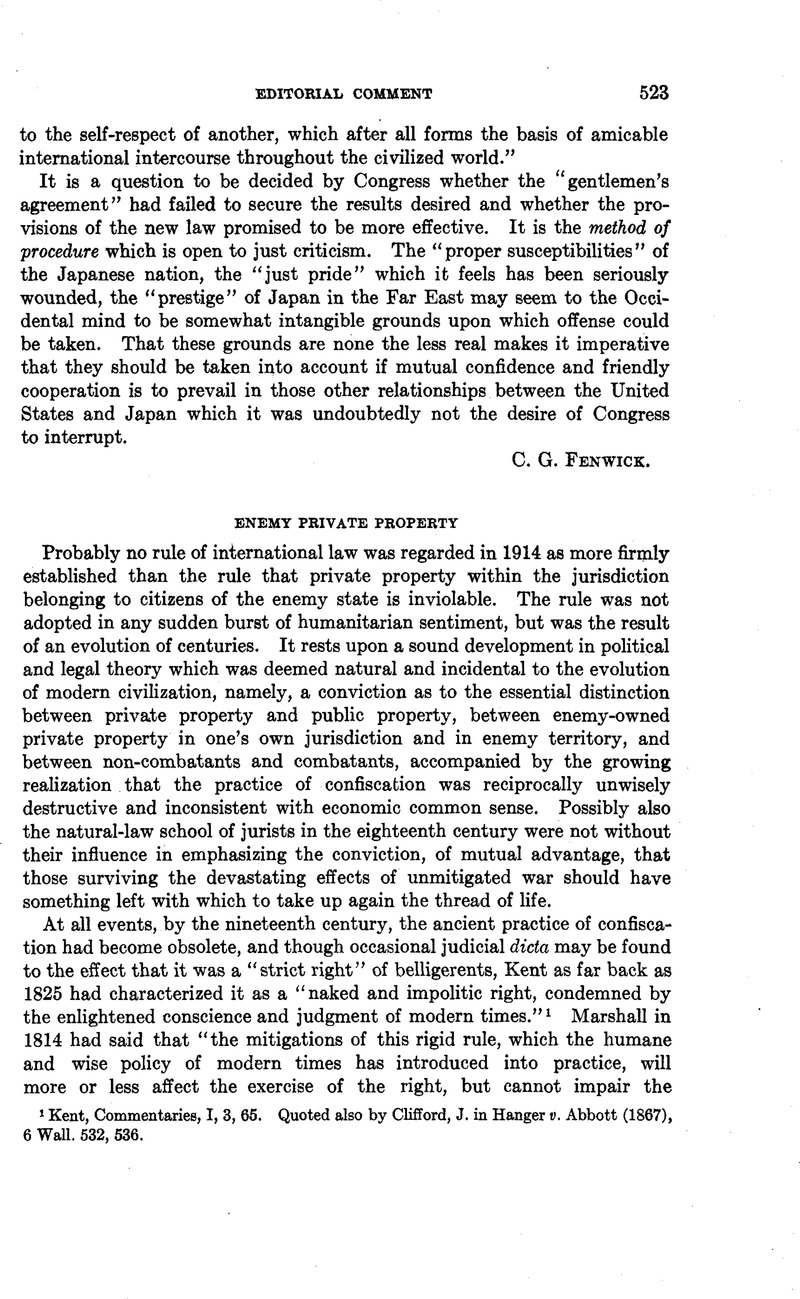Published online by Cambridge University Press: 04 May 2017

1 Kent, Commentaries, I, 3, 65. Quoted also by Clifford, J. in Hanger v. Abbott (1867),6 Wall. 532, 536.
2 Brown v. United States (1814), 8 Cranch 110. He added: “ It is not believed that modern usage would sanction the seizure of the goods of an enemy on land, which were acquired in peace in the course of trade.” He also observed that “according to modern usage,” private property “ ought not” to be confiscated. He said that “ this usage.cannot be disregarded by [the sovereign] without obloquy.”
3 United States v. Percheman (1833), 2 Peters 51. See the celebrated passage in Moore's Digest of International Law, Vol. 7, pp. 312, 313, analyzing the evolution in Marshall's views in this respect, and explaining the inconsistencies embodied in the opinion in Brown v. United States, supra. Judge Moore there says: “ The supposition that usage may render unlawful the exercise of a right, but cannot impair the right itself, is at variance with sound theory.”
4 Wolff v. Oxholm (1817), 6 M. and S. 92. The Danish action in 1807 has been explained by an English writer as not really a case of confiscation, but of retorsion, justified by the unprecedented act of the British fleet without war or warning swooping upon the Danish ships of war and capturing them. Latifi, A., Effects of War on Property. London, 1909,p. 47
5 Russell, Lord, speaking of this Confederate Act, said:“ Whatever may have been the abstract rule of the Law of Nations in former times, the instances of its application in the manner contemplated in the Act of the Confederate Congress in modern and more civilized times are so rare and have been so generally condemned that it may almost be said to have become obsolete.” Lord Russell to Acting Consul Cridland, State Papers, 1862, Vol. 62, no. 1, 108, quoted by Hall, International Law, 7th ed., p. 462, note.Google Scholar
6 See the comment on Miller v. United States (1870), 11 Wall. 268 in 23 Columbia Law Rev. 383, and Hyde, International Law, II, p. 238: “ It is not believed that [the Act of 1862]. . . indicates legislative approval of the confiscation in a foreign war of the property of alien enemies within the national domain.”
7 Latifi, op. cit., p. 48.
8 Lord Finlay, now Judge of the Permanent Court of International Justice, in Stevenson v. Aktiengesellschaft fiir Cartonnagenindustrie [1918, H. L.], A. C. 239, 244. See also Lord Haldane in same case, ibid., 247; Lord Parker in Daimler Co. v. Continental Tyre and Rubber Co. [1916], 2 A. C. 307, 347; Lord Birkenhead in Fried Krupp A. G. v. Ocronera (1917), 88 L. J. Ch. 304, 309; Cardozo, J. in Techt v. Hughes (1920), 229 N. Y. 222, 128 N. E. 185.
9 A striking illustration of the correctness of this opinion is found in the Treaty of Lausanne,coining after the Turkish victory at Smyrna. In that treaty (Article 65) the private property of Turks in Allied countries, confiscated under the Treaty of Sevres, is released from sequestration or confiscation and restored to its owners.
10 Mr. Claude Mullins in Proceedings of the Grotius Society. Vol. 8, p. 89.
11 See the acute observation of John Bassett Moore in this connection: “ It is true that in certain early writers who reiterated the stern rules of the law of Rome,sweeping generalizations may be found in which the right is asserted on the part of enemies to seize all property and confiscate all debts. The same writers, upon the same authority,assert the lawfulness of treating all subjects of the belligerent as enemies, and as such of killing them, including women and children. These generalizations, even at the time when they were written, neither expressed nor purported to express the actual practice of nations,and it is superfluous to declare that the law of the present day is not to be found in them;for, with the change in the practice of nations, growing out of the advance in human thought,the law also has changed.” Moore's Digest of Int. Law, VII, 306.
12 “ Special Report of the Committee appointed by the Board of Trade to advise upon applications for the release of property of ex-enemy aliens in necessitous circumstances.”London, 1924. Cmd. 2046. 15 pp.
13 See Works of Alexander Hamilton (Lodge's edition), Vol. V, pp. 412 et seq. See the extended quotations from Hamilton and the references to the treaties concluded by the United States in Moore, John Bassett, International Law and Some Current Illusions (New York, Macmillan, 1924), pp. 14 et seq.
14 See the instructions of Secretary of State Hay to the American delegates at the First Hague Conference. (Scott, Instructions and Reports of United States Delegates to Hague Peace Conference, p. 9.)
15 Cong. Record, 65th Cong. 1st sess. 4844 et seq. Sen. Rep. 113, 65th Cong. 1st sess.;H. R. Rep. 85, 65th Cong. 1st sess.
16 Stoehr v. Wallace (1920), 255 U. S. 239.
17 Ibid.,p.22.